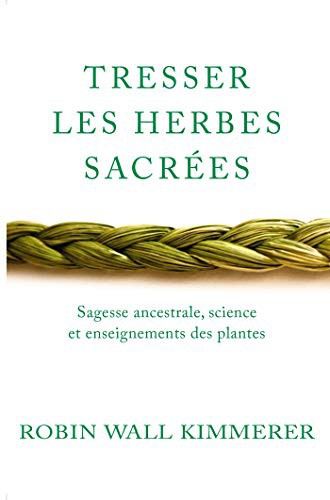Générosité, entraide, gratitude…Une magistrale leçon de vie du monde végétal.
Botaniste, chercheuse de pointe en biologie et amérindienne issue de la nation Potawatomi aux États-Unis, Robin Wall Kimmerer est une conteuse extraordinaire. Elle partage ici ses connaissances scientifi ques des plantes et les légendes de ses ancêtres pour illustrer la culture de la gratitude dans laquelle nous devrions vivre. S’appuyant sur sa triple dimension de scientifi que, femme et indigène, elle nous révèle comment d’autres êtres vivants – verge d’or, fraises, courges, algues, avoine odorante… – nous offrent des cadeaux et des leçons, même si nous avons oublié comment les écouter. Ses réflexions nous montrent comment nous sommes appelés à une relation réciproque avec le reste du monde vivant. Car ce n’est que lorsque nous entendrons les langues des autres êtres que nous serons capables de comprendre la générosité de la terre et d’apprendre à donner en retour.
« Kimmerer est une auteure d’une grâce rare. Elle nous entraîne dans un récit aussi intelligent que sage, mêlant mythes et science, sacré et histoire. C’est une grande pédagogue et ses mots forment un hymne d’amour pour le monde. » Elizabeth Gilbert, auteure de Mange, prie, aime.
« Kimmerer a écrit un livre extraordinaire. Ce que j’aime par-dessus tout, c’est sa manière de capturer la beauté. Les images de cèdres géants et de fraisiers sauvages, d’une forêt sous la pluie ou d’une prairie d’herbes odorantes resteront gravées dans votre esprit longtemps après avoir lu ce livre. » Jane Goodall
« Remarquable, sage et potentiellement révolutionnaire .» The Guardian
« Meilleur essai de la décennie. » - Literary Hub
Paroles de lecteurs :
« Je n’ai jamais lu de si beaux écrits sur la nature ! »
« Lisez ce livre, relisez-le, transmettez-le. C’est un cadeau. »
« Ce livre a littéralement changé ma façon de voir le monde. »
Robin Wall Kimmerer est mère, scientifi que, professeure émérite et membre inscrite de la nation Potowatomi. Son premier livre, Gathering Moss, a été récompensé par la John Burroughs Medail pour ses écrits exceptionnels sur la nature. Ses textes ont été publiés dans de nombreuses revues scientifi ques. Elle vit dans l’État de New York, où elle est professeure distinguée de biologie environnementale à SUNY (The State University of New York), fondatrice et directrice du Center for Native Peoples and the Environment (Centre pour les peuples autochtones et l’environnement).




